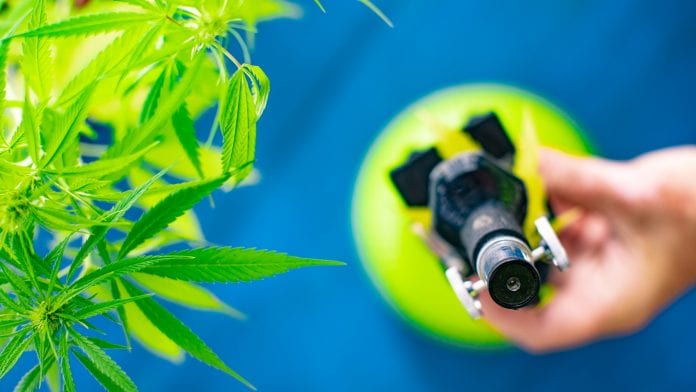
A new white paper has been published by leaders in the cannabis field, showcasing how to maximise clinical research and improve patient access to medical cannabis in the UK.
Following the approval of medical cannabis in the UK in November 2018, only two patients have gained access to full extract cannabis medicine through an NHS prescription. The authors have produced the white paper, ‘Medical cannabis in the UK: From principle to practice’ to help reduce the disparity in demand and supply.
The medical cannabis white paper puts forward potential solutions for healthcare workers prescribing medical cannabis, and for regulators in responding to the demand for access in the face of limited research for specific conditions – suggesting how to accelerate the integration of medical cannabis into UK healthcare.
Co-author, Anne Schlag, said: “This paper highlights current barriers to prescribing medical cannabis in the UK, and outlines potential solutions to overcome these. It is a tragedy that despite the legalisation of medical cannabis in November 2018, no new NHS prescriptions have been written, and patients, many of whom have been shown to benefit from the medicine, are still unable to access it.”
Medical Cannabis Network editor Stephanie Price spoke to co-author Professor Mike Barnes to find out more.
Medical cannabis access in the UK
Access to cannabis prescriptions on the NHS has been extremely limited, and privately only around 400 prescriptions have been given. The types of cannabis-based medicinal products (CBMPs) that patients have access to has also been limited.
Barnes said: “The Department of Health would have a different number for the amount of prescriptions given because they also count licenced cannabis medications which are Epidiolex, Sativex, and to a lesser extent Nabilone – none of which are full extract cannabis products.
“One of the major barriers to access in the UK is education. All doctors have never been trained in cannabis and the endocannabinoid system. Quite rightly doctors who don’t understand a particular medicine don’t want to prescribe it – and shouldn’t. One of the focusses of the paper is on the need to provide education for interested parties, namely doctors who could prescribe or may in the future, like GPs.
“We are tackling this in small ways, such as with the Academy of Medical Cannabis which I run, through Drug Science teaching sessions as part of Project Twenty21, and through the Medical Cannabis Clinicians Society. I have personally trained around 55 doctors, but I would like to see more doctors prescribing by the end of the year.
“The endocannabinoid system is vital to the body’s homeostasis and it is not really taught in many medical schools so I would like to see it introduced into the medical education system. However, unfortunately, there is nobody in the UK co-ordinating what doctors should be trained on, so it is up to the individual medical schools. I think it will happen in time as it is now an accepted part of human functioning.”
Gold standards in medicine
Barnes notes that another barrier to access is the negative guidelines produced by NICE related to double blind, placebo-controlled studies. The conclusion of the guidelines currently is that doctors can only prescribe cannabis in exceptional circumstances until there is more evidence.
Barnes said: “I fundamentally disagree with the NICE guidelines. Double blind, placebo-controlled studies are quite rightly the gold standard in pharmaceutical medicine. When you have a single molecule medicine you can easily go through these studies to see how they compare, however, cannabis does not lend itself to that.
“It is a botanical product. It is a whole family of medicines with 113 cannabinoids and more than 100 terpenes, and every individual person is very different. For pain for example, some people may respond to a low-CBD cannabis, some may respond to a balanced one, and others may respond to a high-THC strain. If you take each individual strain, they are not likely to be positive against a placebo as they only help a portion of people.
“So, there needs to be a different approach with the interpretation of cannabis – for example, relying on observational studies, ‘N of 1’ studies, or patient audit studies like Project Twenty21. Thousands of studies with positive results about cannabis have been ignored by NICE because they are not double blind, placebo-controlled studies.
“We do, however, need more studies and a huge amount more evidence about what strains work for which condition, but currently there is enough evidence to learn more as we prescribe.”
Accelerating cannabis in the UK
Patients often face other barriers such as costs and geographic location, and Barnes highlights that telemedicine could help to improve this for patients with online consultations, not restricted by location.
Barnes also emphasised the importance of NHS Trusts understanding funding issues. He said: “Doctors have been stopped from prescribing medical cannabis because of funding issues, but the NHS Trusts need to understand that cannabis can actually save money and reduce the burden on healthcare.
“With cannabis, we are able to stop using more expensive medicines such as opioids, as well as stopping people from being admitted to hospital because of their health condition. Overall, cannabis can be introduced at less cost than existing medicines, so I would like more economic studies. We want Matt Hancock to keep his promise that cost will not be a barrier to access.”
To read the open-access white paper, please visit Sage Journal of Psychopharmacology. Authors of the white paper were Katrin Anne Schlag, David S Baldwin, Michael Barnes, Steve Bazire, Rachel Coathup, H Valerie Curran, Rupert McShane, Lawrence D Phillips, Ilina Singh, and David J Nutt.



















Well, this is actually very important and I think it would be nice to expand the scope and the sales of cannabis in the country. I believe that there is nothing wrong with this, especially since it is considered partial legalization, so they can not use cannabis, probably. I don’t have exact information. The most important thing is that people are ready for this.